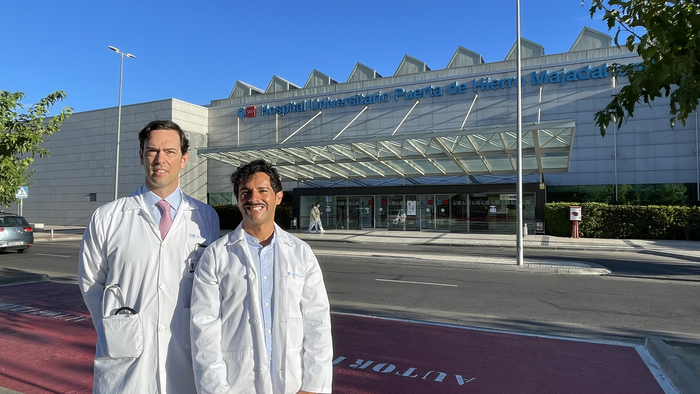Scientists at the CNIC and Hospital Universitario Puerta de Hierro in Majadahonda have developed a software application that predicts the likelihood that a case of dilated cardiomyopathy is caused by a genetic mutation. The research was carried out in collaboration with hospitals in Spain, Italy, and the Netherlands. The findings, published in the Journal of the American College of Cardiology (JACC), will allow physicians to adjust the treatment of dilated cardiomyopathy patients appropriately and to identify family members who have also inherited the disease. The software application is available online at www.madriddcmscore.com .

Credit: CNIC
Scientists at the CNIC and Hospital Universitario Puerta de Hierro in Majadahonda have developed a software application that predicts the likelihood that a case of dilated cardiomyopathy is caused by a genetic mutation. The research was carried out in collaboration with hospitals in Spain, Italy, and the Netherlands. The findings, published in the Journal of the American College of Cardiology (JACC), will allow physicians to adjust the treatment of dilated cardiomyopathy patients appropriately and to identify family members who have also inherited the disease. The software application is available online at www.madriddcmscore.com .
Dilated cardiomyopathy is the most frequent cause of heart failure in young people and the main indication for heart transplantation in the world. The disease is characterized by enlargement of the heart accompanied by a decine in its capacity to pump blood, and patients with this condition are at high risk of arrhythmias and sudden cardiac death.
In approximately 30% of patients with dilated cardiomyopathy, the disease arises as a consequence of a heritable genetic mutation. Knowing that a patient’s disease has a genetic cause allows physicians to adjust treatment appropriately and to identify other family members who have also inherited the disease.
Nevertheless, in many places in the world dilated cardiomyopathy patients do not undergo routine genetic screening due to the considerable cost of this procedure, which gives a positive result in only 1 in every 3 patients.
The new study was led by cardiologist Dr. Pablo García-Pavía of Hospital Puerta de Hierro, and who is also a research scientist at the CNIC and in the Spanish cardiovascular research network (CIBERCV). The study analyzed the clinical characteristics, electrocardiograms, and echocardiography data of a group of 1015 dilated cardiomyopathy patients who underwent genetic screening at 20 Spanish hospitals.
The results identified 5 parameters that were more frequent in patients in whom the disease was caused by a genetic mutation.
The combined scoring of these 5 parameters in a software application, called the Madrid Genotype Score, allows the classification of patients according to the likelihood that their disease has an origin in a heritable genetic mutation. First author Dr. Luis Escobar explained that “among patients positive for most of these parameters, the disease was more likely to have a genetic cause, whereas among patients negative for the parameters or postive for only one or two, the probability was lower. A genetic cause was found in only 2% of patients negative for all 5 parameters.”
The researcher team verified the predictive ability of the tool in an independent group of 1097 dilated cardiomyopathy patients from Italy and the Netherlands.
The software application has been made feely available to medical professionals via the website www.MadridDCMscore.com, and the tool is expected to facilitate the genetic screening of dilated cardiomyopathy patients, given that it identifies those patients most likely to have a causal genetic mutation.
Journal
Journal of the American College of Cardiology
DOI
10.1016/j.jacc.2022.06.040
Method of Research
Randomized controlled/clinical trial
Subject of Research
People
Article Title
Clinical Risk Score to Predict Pathogenic Genotypes in Patients With Dilated Cardiomyopathy
Article Publication Date
12-Sep-2022




